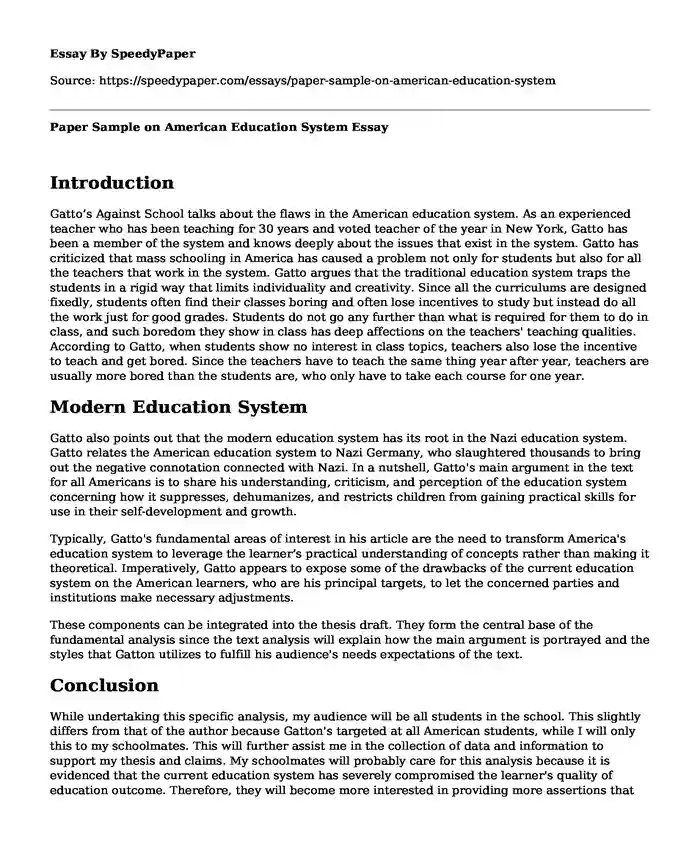
| Type of paper: | Essay |
| Categories: | Education United States |
| Pages: | 2 |
| Wordcount: | 539 words |
Introduction
Gatto’s Against School talks about the flaws in the American education system. As an experienced teacher who has been teaching for 30 years and voted teacher of the year in New York, Gatto has been a member of the system and knows deeply about the issues that exist in the system. Gatto has criticized that mass schooling in America has caused a problem not only for students but also for all the teachers that work in the system. Gatto argues that the traditional education system traps the students in a rigid way that limits individuality and creativity. Since all the curriculums are designed fixedly, students often find their classes boring and often lose incentives to study but instead do all the work just for good grades. Students do not go any further than what is required for them to do in class, and such boredom they show in class has deep affections on the teachers' teaching qualities. According to Gatto, when students show no interest in class topics, teachers also lose the incentive to teach and get bored. Since the teachers have to teach the same thing year after year, teachers are usually more bored than the students are, who only have to take each course for one year.
Modern Education System
Gatto also points out that the modern education system has its root in the Nazi education system. Gatto relates the American education system to Nazi Germany, who slaughtered thousands to bring out the negative connotation connected with Nazi. In a nutshell, Gatto's main argument in the text for all Americans is to share his understanding, criticism, and perception of the education system concerning how it suppresses, dehumanizes, and restricts children from gaining practical skills for use in their self-development and growth.
Typically, Gatto's fundamental areas of interest in his article are the need to transform America's education system to leverage the learner’s practical understanding of concepts rather than making it theoretical. Imperatively, Gatto appears to expose some of the drawbacks of the current education system on the American learners, who are his principal targets, to let the concerned parties and institutions make necessary adjustments.
These components can be integrated into the thesis draft. They form the central base of the fundamental analysis since the text analysis will explain how the main argument is portrayed and the styles that Gatton utilizes to fulfill his audience's needs expectations of the text.
Conclusion
While undertaking this specific analysis, my audience will be all students in the school. This slightly differs from that of the author because Gatton's targeted at all American students, while I will only this to my schoolmates. This will further assist me in the collection of data and information to support my thesis and claims. My schoolmates will probably care for this analysis because it is evidenced that the current education system has severely compromised the learner's quality of education outcome. Therefore, they will become more interested in providing more assertions that correctly supports the proposal of a new system, as Gatton proposed it in his article. Besides, the schoolmates will care for this analysis because of the view, though, or opinion, that a better solution to the failed system is discussed coherently.
Cite this page
Paper Sample on American Education System. (2024, Jan 01). Retrieved from https://speedypaper.com/essays/paper-sample-on-american-education-system
Request Removal
If you are the original author of this essay and no longer wish to have it published on the SpeedyPaper website, please click below to request its removal:
- Southwest Airlines Case Study Sample, Free Essay for You
- Free Essay on the United States Role in the World in the Early Twentieth-Century
- Free Essay Describing Elements of Creativity in the Business World
- Talent Plus, Inc.
- Summary of "Hiroshima" - Book Review Essay Sample
- Paper Example: U.S. Customs and Border Protection Challenges
- Essay Sample on New York City: Literature Review
Popular categories




